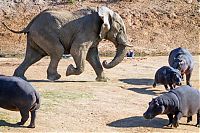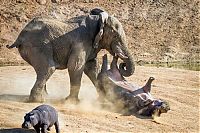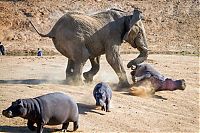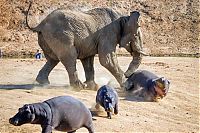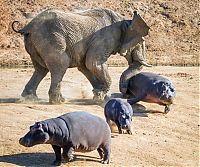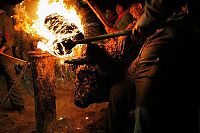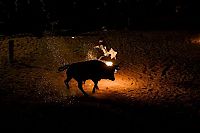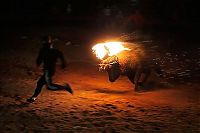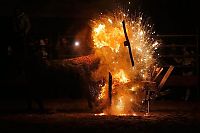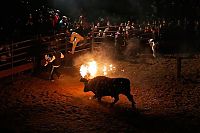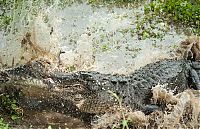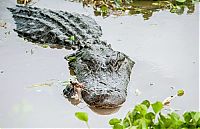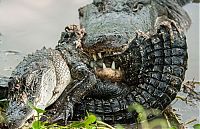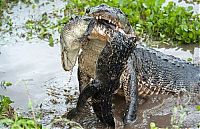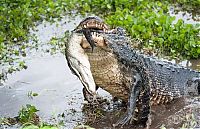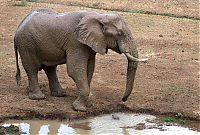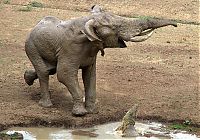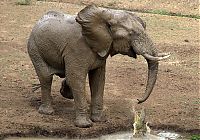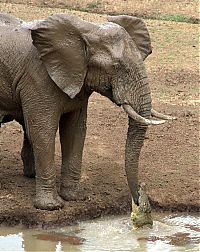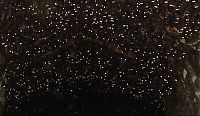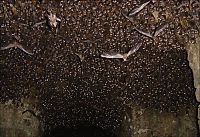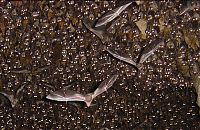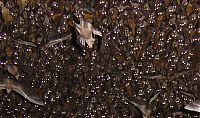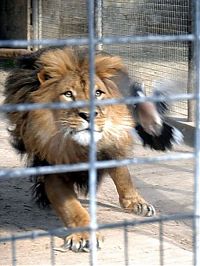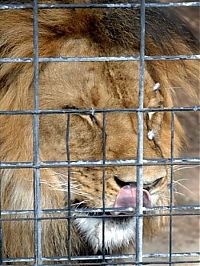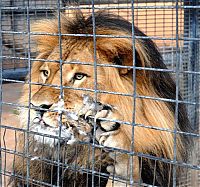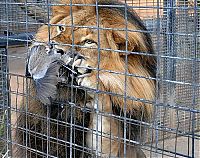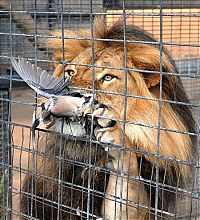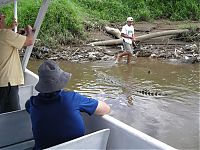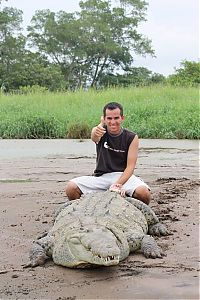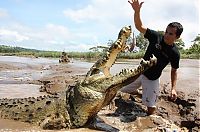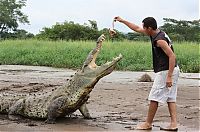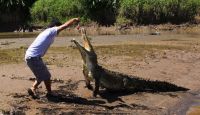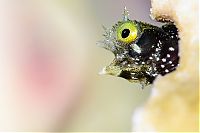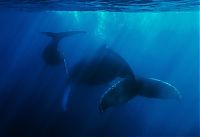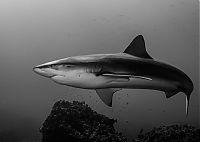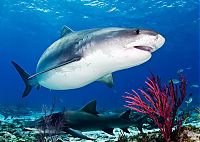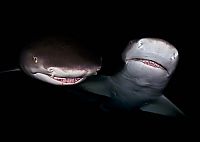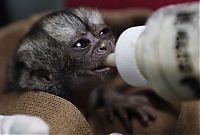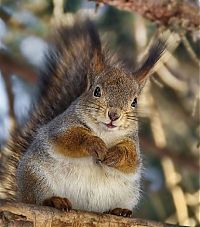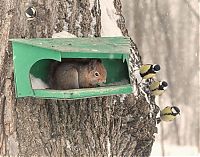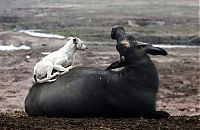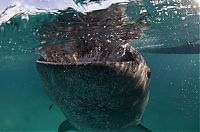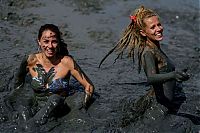Angry Elephant Attacks A Hippopotamus
Thursday, 14th November 2013, 00:33:46
Album: Fauna & Flora, New uploads: 5, Hits: 519, Size: 0MiB
The hippopotamus (Hippopotamus amphibius), or hippo, from the ancient Greek for "river horse" (Ιπποπόταμος), is a large, mostly herbivorous mammal in sub-Saharan Africa, and one of only two extant species in the family Hippopotamidae (the other is the Pygmy Hippopotamus.) The hippopotamus is the third largest land animal (after the elephant and the white rhinoceros) and the heaviest extant artiodactyl, despite being considerably shorter than the giraffe...
Toro Jubilo, Toro De Fuego, Medinaceli, Spain
Wednesday, 13th November 2013, 03:00:35
Album: Fauna & Flora, New uploads: 8, Hits: 1217, Size: 0MiB
A toro de fuego ("fire bull") is a festive activity in which a bull-resembling metal frame, with fireworks attached to it, is set alight, and then a person carrying the frame runs around town at night as if chasing people in the streets. Participants dodge the bull-frame when it comes close, especially because the burning fireworks set off sparks that can cause small burns in people's skin or clothes. This activity is held in a number of Spanish towns during their local festivals...
Alligator Eats An Alligator
Wednesday, 13th November 2013, 02:40:42
Album: Fauna & Flora, New uploads: 6, Hits: 624, Size: 1MiB
An alligator is a crocodilian in the genus Alligator of the family Alligatoridae. There are two living alligator species: the American alligator (Alligator mississippiensis) and the Chinese alligator (Alligator sinensis). In addition, several extinct species of alligator are known from fossil remains. Alligators first appeared during the Oligocene epoch about 37 million years ago...
Elephant With Its Trunk Grabbed By Crocodile
Monday, 11th November 2013, 13:32:09
Album: Fauna & Flora, New uploads: 4, Hits: 645, Size: 0MiB
Elephants are large land mammals in two genera of the family Elephantidae: Elephas and Loxodonta. Three species of elephant are living today: the African bush elephant, the African forest elephant and the Asian elephant (also known as the Indian elephant). All other species and genera of Elephantidae are extinct, some since the last ice age although dwarf forms of mammoths may have survived as late as 2,000 BC...
Bats In The Cave
Wednesday, 30th October 2013, 23:25:39
Album: Fauna & Flora, New uploads: 4, Hits: 611, Size: 0MiB
Bats are flying mammals in the order Chiroptera. The forelimbs of bats are webbed and developed as wings, making them the only mammals naturally capable of true and sustained flight. By contrast, other mammals said to fly, such as flying squirrels, gliding possums and colugos, glide rather than fly, and can only glide for short distances...
Lion Against A Pigeon
Monday, 28th October 2013, 00:05:22
Album: Fauna & Flora, New uploads: 8, Hits: 1644, Size: 1MiB
Pigeons and doves constitute the bird family Columbidae within the order Columbiformes, which include some 300 species of near passerines. In general terms "dove" and "pigeon" are used somewhat interchangeably. In ornithological practice, there is a tendency for "dove" to be used for smaller species and "pigeon" for larger ones, but this is in no way consistently applied, and historically the common names for these birds involve a great deal of variation between the terms "dove" and "pigeon...
Crocodile River Adventure, Tarcoles River, Tarcoles, Costa Rica
Friday, 25th October 2013, 14:15:04
Album: Fauna & Flora, New uploads: 19, Hits: 3133, Size: 2MiB
Tour guide Jose Eduardo Chaves Salas runs Jose's Crocodile River Tour on the Tarcoles River. He entertains tourists by doing tricks with crocodiles. Jose's Crocodile River Tour takes place on the Tarcoles River in Central Pacific Costa Rica. You can get up-close with American crocodiles of all sizes, and observe an abundance of beautiful exotic birds. Enjoy spectacular rainforest scenery and cruise through dense mangrove forest canals...
Underwater Photography By Todd Bretl
Monday, 21st October 2013, 15:43:53
Album: Fauna & Flora, New uploads: 30, Hits: 3744, Size: 2MiB
Raised on a boat in Bermuda, Todd Bretl grew up with the ocean as his playground and constant companion. After years spent in envy of the island's many scuba divers, he eagerly began diving as soon as he was able, at the age of 12. Hundreds of dives later, and on an impulsive desire to try something new, Todd purchased some basic underwater photography equipment to experiment with during a 2008 dive trip to Palau...
Animal Photography
Wednesday, 16th October 2013, 10:02:27
Album: Fauna & Flora, New uploads: 16, Hits: 2187, Size: 1MiB
Animals are a major group of multicellular, eukaryotic organisms of the kingdom Animalia or Metazoa. Their body plan eventually becomes fixed as they develop, although some undergo a process of metamorphosis later on in their life. Most animals are motile, meaning they can move spontaneously and independently. All animals are also heterotrophs, meaning they must ingest other organisms for sustenance...
| History | 1 | - | 7 | 8 | 9 | 10 |
|
|
||||||||||||||
